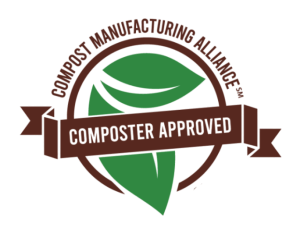Frequently Asked Questions
Certified Products (CMA-I, CMA-G, CMA-A, CMA-W)
Certified products must meet ASTM D6400 or ASTM D6868 standards, plus they must pass a disintegration test that is done by composting process. There are three main types we test in, and they will have designations in their certifications accordingly. For example, Cedar Grove Composting has a covered in-vessel system, so their certification code is CMA-I. We have windrow facilities in Missouri and Illinois, and they are designated CMA-W.
Substrate Accepted Products (CMA-S)
There are some product categories that do not have an ASTM standard, per se, or that do not meet ASTM standards as there are no ASTM compliant items in the category. We accept these conditionally, and do not call them certified. This is the CMA-S category. This includes things like wood cutlery, clay coated food trays, wood stir sticks, or uncoated/untreated paper items.
Each of these designations represents our various acceptance lists. CMA speciates out its certification by the composting process in which the item was tested. We do this to provide additional transparency to the public, and to ensure certified products have been proven to work for the composting systems meant to process them.
CMA-I: Certified for Covered In-Vessel Industrial Composting Systems
CMA-W: Certified for Windrow Industrial Composting Systems
CMA-A: Certified for Aerated Static Pile Industrial Composting Systems
CMA-S: Approved as a composting substrate in industrial composting. Exclusively for a narrow set of qualifying items that provide carbon without excessive additives or treatments.
To certify a product through CMA’s program, the following is required:
- Submission paperwork (profile, PFAS addendum, etc.)
- The product’s constituency must be declared*
- Total fluorine lab results confirming final product contains less than 100ppm from a CMA Approved Lab
- ASTM D6400 or D6868 passing results from a CMA Approved Laboratory, testing for:
- FTIR analysis
- % Ash
- Heavy metals analysis
- Phytotoxicity
- Disintegration results
- Biodegradation results
- Passing field test result from a CMA conducted field test
*Note: Additional documentation may be required depending on the constituency and nature of the product.
Since we do not mandate logo use, and to avoid charging more for field testing, we do not include automatic use of the logo upon certification. A separate license agreement and fee must be paid for use of the CMA name or logo. We have an "a la carte" fee structure to fit the needs of different companies.
Variations have been shown to exist in the disintegration performance of different cutlery pieces, so each one would count as a separate SKU, as well as each color, as some pigments may affect the disintegration of the products, from our experience.
No. We are a private LLC partnership of compost facilities and have a growing number of affiliates across North America. Our certification is intended to provide receiving facilities (composters) with a standard that give them an indication of what products that will disintegrate in their facilities.
Yes, as long as the submission profile has the manufacturer's signature verifying their accountability for the information on the product, and they send a letter or e-mail verifying that you are submitting on their behalf.
A dye test is done on paperboard products with a compostable coating. It is CMA’s test method for confirming that a coating has broken down in the composting process. The dye test helps us confirm that the coating has disintegrated and will not impede further disintegration of the paperboard. Coated paperboards are frequently used for things like hot cups. We have a conditional acceptance category for coated paperboard as part of our plastic elimination strategy. Paper cups are a high volume contaminant. Conditionally accepting compostable coated items avoids receiving a high volume of PET coated boards, which would be worse.
Generally, no. We request a representative sample of the line (usually including the smallest and the largest) plus documentation that the constituency between all sizes in the group are exactly the same, other than size. The shape of the product can affect disintegration so we do require different shapes to be tested, even when made from the same material.
There are different interpretations of some aspects of the ASTM laboratory standards. We are not privy to other certifiers' interpretations and, therefore, we cannot tell if their interpretation matches the way we read these standards. If we accept another certification for one customer, and another customer has only the laboratory report, we run the risk of treating customers differently. Additionally, if any errors are made in the underlying certification, if we accept that certification we are signing on to and complicit in any errors they make.
